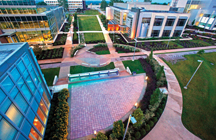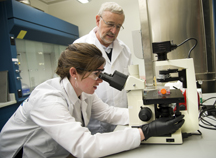Purdue's Discovery Park surpasses $1 billion milestone in research investments, impact
May 2, 2014
 |
|
Discovery Park is sparking a revolution in Purdue's approach to tackling global challenges, reinventing how research is done at a major university. Pictured at sunrise are its key research facilities with the landmark McGinley Plaza Fountain in the center. (Purdue University file photo) Download Photo |
WEST LAFAYETTE, Ind. - An effort to focus and bolster interdisciplinary research activities just 13 years ago is now a $1 billion enterprise at Purdue University.
Discovery Park, launched in October 2001 with a $26 million grant from Lilly Endowment, has surpassed the $1 billion milestone based on the amount of generated sponsored research, private gifts and endowments, Purdue officials announced Friday (May 2).
"Discovery Park has reached a major milestone in surpassing the $1 billion mark through research expenditures, laboratory and equipment investment, and endowments," said Purdue President Mitch Daniels. "The question going forward is how we can take this unique university model for impactful, interdisciplinary research to the next level."
At Discovery Park, researchers tackle challenges in areas ranging from energy, cancer treatment, nanotechnology, drug discovery and the environment to health care, life sciences, and innovative learning in the STEM disciplines of science, technology, engineering and mathematics.
Graduate and undergraduate students work alongside some of the world's brightest research minds in advancing research. The Burton D. Morgan Center for Entrepreneurship links campus activities with resources and expertise for advancing these ideas to the marketplace where they can have greater societal impact on changing people's lives.
Purdue has added nearly 150,000 square feet of research laboratory space, 100,000 square feet of office and meeting space, and $34 million worth of new laboratory and research equipment through Discovery Park.
And the five research and office buildings in Discovery Park - the Birck Nanotechnology Center, Bindley Bioscience Center, Mann Hall, Burton D. Morgan Center for Entrepreneurship, and the Hall for Discovery and Learning Research - will grow by two over the next few months with the opening of the Hall for Drug Discovery and the Multidisciplinary Cancer Research Facility.
To date, the economic impact of Discovery Park includes:
* $771.7 million in research expenditures through major centers since Discovery Park was launched, including 13 funded research projects exceeding $5 million each and eight multiyear proposals each exceeding $10 million.
* More than 1,000 affiliated faculty members, working with 300 graduate students, are engaged in the park, helping generate $83.9 million in funded research for 2012-13, or 25 percent of Purdue's entire annual research portfolio.
* Fifty-seven new companies seeded and/or assisted.
* 426 disclosures, patents, licenses/options on intellectual property facilitated within the park, linking it to business startup activities at the nearby Purdue Research Park.
* 211,500 hours of work provided by 540 students at 190 Indiana startup companies through its Interns for Indiana (IfI) program.
* More than 5,000 students have participated in entrepreneurial activities since the inception of Discovery Park.
* Forty strategic global partnerships have been signed.
* More than 1,300 students have received the Certificate in Entrepreneurship and Innovation. Recipients have come from every college and have an average cumulative GPA at or higher than 3.0.
"Our faculty and students are key players in a world that demands better-prepared employees for the workforce, a more dynamic mechanism to get research to the marketplace faster and stronger U.S. research institutions to compete in the global fields of science and technology," said Discovery Park executive director Alan Rebar, senior associate vice president for research. "Through Discovery Park and the impact of its first 12 years, Purdue is responding to these demands."
With a $26 million lead grant from the Lilly Endowment, the state's largest philanthropic organization, significant funding was received to help Purdue launch the Birck Nanotechnology Center, Bindley Bioscience Center, Burton D. Morgan Center for Entrepreneurship and the e-Enterprise Center during Discovery Park's first phase in 2001-02. Formation of the Discovery Learning Research Center came shortly thereafter.
Through a second Lilly Endowment grant totaling $25 million in January 2005, Purdue nearly doubled Discovery Park's size, adding the Cyber Center, Energy Center, Center for Environment and Oncological Sciences Center. In addition, Purdue committed to raising $3 million for an endowment for additional financial support for the six existing centers.
Additional core centers in Discovery Park today include the Regenstrief Center for Healthcare Engineering, Center for Global Food Security, Purdue Climate Change Research Center, Center for Predictive Materials and Devices and the Purdue Center for Drug Discovery.
"The Endowment initially was intrigued with the multidisciplinary character of the vision for Discovery Park," said Sara Cobb, vice president for education at Indianapolis-based Lilly Endowment. "This unique character held great promise for bringing together so many of Purdue's considerable strengths. We are pleased to see how that promise has been realized."
Discovery Park plays a lead role in developing young faculty and researchers at Purdue, offering valuable programs, collaborations, workshops, mentoring and training to advance large-scale research across disciplines and moving research from the lab to the marketplace.
"Purdue has not only created a culture where faculty all across campus can work and develop in research-driven centers but also continues to invest and advance this unique model," said biomedical engineering professor Sherry Voytik-Harbin, a Discovery Park fellow in 2014. "That place is Discovery Park, where faculty members, students and researchers from other universities or industry are coming together to achieve new goals and solve challenges that make a difference in our world."
Discovery Park's success also stems from the connections it fosters between student and teacher. With its interdisciplinary focus, particularly in the STEM areas, Discovery Park uses the power of that connection to establish stronger ties at the local, state, national and global levels to address the major challenges facing our world today.
"The park also is providing Purdue with modern, state-of-the-art research facilities for helping educate students," said Gen Kruzick, an undergraduate student in foods and nutrition from Winamac, Indiana, a 2013 participant in the Discovery Park Undergraduate Research Internship Program. "While we're learning the subject matter of our specific disciplines, we're learning to use it and apply it in an interdisciplinary way, adding tremendous value to our Purdue experience and positioning us for exciting careers moving forward."
Désirée White-Schenk was looking to combine her studies in chemistry with biomedical engineering for her doctoral degree. She was drawn to Discovery Park and the opportunity to study with School of Veterinary Medicine Endowed Professor of Nanomedicine James Leary. Today, she is developing nanoparticles designed to help treat spinal cord injuries.
 |
|
Doctoral student Désirée White-Schenk works with James Leary, the School of Veterinary Medicine Endowed Professor of Nanomedicine, on a nanoparticle for helping treat spinal cord injuries. White-Schenk selected Purdue for her doctoral studies in biomedical engineering and nanomedicine largely because of state-of-the-art research facilities, such as Discovery Park's Birck Nanotechnology Center, and the opportunity to study alongside Leary. (Purdue University photo/Mark Simons) Download Photo |
"The buildings, the laboratories, the quality of the research - all have been instrumental in my studies," said White-Schenk, of New Baltimore, Michigan. "Discovery Park and its environment have been terrific in helping with collaborators for my research focused on preventing damage from the secondary chemical reaction that destroy tissues after a spinal cord injury."
Corporations are forming strategic alliances with park centers, seeking research and partnerships for honing their competitive edge. Purdue's alumni and friends have seen its potential and are contributing to build the facilities, buy the equipment and fund administrative infrastructure.
Because of its modern equipment and the completed research facilities in Discovery Park, private companies and organizations are calling to inquire how they too can gain an edge in a competitive global marketplace, said Mark Lundstrom, the Don and Carol Scifres Distinguished Professor of Electrical and Computer and founding director of the Network for Computational Nanotechnology.
"Industrial and corporate partners across the globe are very interested in the research we can do for them in nanotechnology, energy, life sciences, advanced manufacturing, health care engineering, cancer and other areas," Lundstrom said.
Efforts through the Burton D. Morgan Center for Entrepreneurship help accelerate the understanding and application of entrepreneurship with faculty, staff and students across campus and with stakeholders globally.
The center plays a key role in facilitating business development for emerging concepts and technologies stemming from Purdue research. It also houses the Certificate in Entrepreneurship program, space for the Office of Technology Commercialization and other entrepreneurial activities including conferences and the Purdue Foundry, a program to help Purdue faculty, staff and students commercialize their innovations.
"The Purdue Foundry is currently assisting more than 60 entrepreneurs whose startups and ideas are based on a Purdue innovation or know-how," said Greg Deason, executive director of the Purdue Foundry. "Having space in Discovery Park is important because it provides easier access for Purdue innovators to further develop their startups."
All of the activities support Purdue's entrepreneurial ecosystem.
"Discovery Park is speeding up inventions and accelerating technology commercialization for advancing our high-tech industry in the state of Indiana," said chemical engineering professor Joseph Pekny, interim director of the Burton D. Morgan Center. "Discovery Park activities are having a tremendous economic impact in shaping the future of Indiana and the entire Midwest."
Writers: Phillip Fiorini, 765-496-3133, pfiorini@purdue.edu
Cynthia Sequin, 765-413-6-31, casequin@prf.org
Sources: Mitch Daniels, president@purdue.edu
Alan Rebar, 765-496-6625, rebar@purdue.edu
Sara Cobb, 317-916-7309, cobbs@lei.org
Sherry Voytik-Harbin, 765-496-6128, harbins@purdue.edu
Mark Lundstrom, 765-494-7715, lundstro@purdue.edu
Greg Deason, 765-588-3363, gwdeason@purdue.edu
Joseph Pekny, 765-494-7901, pekny@purdue.edu

